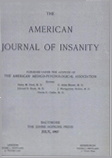FURTHER FOLLOW-UP RESULTS IN INSULIN-SHOCK THERAPY
Abstract
The results of insulin-shock therapy, with an immediate recovery rate of 55 per cent, show a tendency to level off at about 33 per cent in the second, third, and fourth years. (This tendency continues in the few cases which could be followed for 5 years.) With an immediate recovery rate 5 times that of control cases in the Pennsylvania Hospital and with a long distance recovery rate twice that of controls, the therapy seems justified.
Three cases died of insulin-shock. In the other 185 cases there seem to be no signs of brain damage and no signs of mental deterioration greater than is found in schizophrenic patients not treated by shock. Eight recovered patients are doing their work with judgment and initiative 5 years after the termination of therapy. Two more made "spontaneous" recoveries some years after discharge from the hospital.
In all, there are 7 deaths in the insulin-shock group of 188; in a control group of 116 patients there were 10 deaths. The control group was followed for a greater average number of years, but the deaths seem to be about in proportion to those of the insulin group.
The good results from insulin treatment were produced at once—in about 6 weeks from the beginning of treatment. The good results in the control cases came in half the cases years after the admission to the hospital. In 13 of the cases recorded after the first year as unimproved, there were good remissions of at least one year (totalling 15 years) in which the patients supported themselves.
The difficulties in finding the prognosis in schizophrenia are well brought out in the papers of Romano and Ebaugh(2), Rupp and Fletcher(3), with their attached references.
The therapeutic activity which is involved in insulin-shock, with the remarkable immediate results visible to other patients and to nurses and physicians, creates hope in patients, families of patients, and staff. It opens a door for research into the psychological, cortical, metabolic nature of schizophrenia.
Access content
To read the fulltext, please use one of the options below to sign in or purchase access.- Personal login
- Institutional Login
- Sign in via OpenAthens
- Register for access
-
Please login/register if you wish to pair your device and check access availability.
Not a subscriber?
PsychiatryOnline subscription options offer access to the DSM-5 library, books, journals, CME, and patient resources. This all-in-one virtual library provides psychiatrists and mental health professionals with key resources for diagnosis, treatment, research, and professional development.
Need more help? PsychiatryOnline Customer Service may be reached by emailing [email protected] or by calling 800-368-5777 (in the U.S.) or 703-907-7322 (outside the U.S.).



